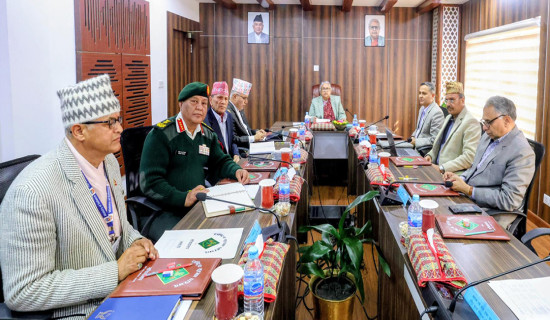- Thursday, 5 March 2026
Family Court To Hear Matrimonial Cases
Nepal did launch the family court last week. The court has been commenced from Kathmandu District Court - the country’s better equipped court at the lower rung. This marks the first ever starting of the family court in Nepal's judiciary. As mentioned by the newly appointed chief justice Biswambhar Prasad Shrestha, the family bench embedded in the Kathmandu district court as a separate facility will prioritise towards giving speedier services over matters concerning women's claim for share on family property and other family related issues. According to chief justice Shrestha this facility will be extended to Bhaktapur and Lalitpur districts in the days to come.
The family court (bench) aims to enhance citizen's access to justice and ensure proper judicial services. The bench will hear cases related to partition of family property among coparceners, matrimonial disputes, domestic violence, child custody and so on. Several countries have separate family courts to hear cases with women as plaintiffs. Such courts mainly deal with issues of property disputes, divorce or domestic violence, among others. However in Nepal, instead of instituting entirely new courts, the Supreme Court chose to set up separate bench at the district court. Thousands of cases, some as old as a decade, are pending in the three tiers of courts. Having separate bench is believed to ensure faster justice delivery and quicker disposal of cases. The need for such a family court or bench, however, was felt long back.
SC ruling
The Supreme Court itself had made a ruling to this effect and even did homework in the past. Almost one and half decade back, the court had delivered a verdict directing the government to establish fast track courts to handle cases involving women and children. However, nothing had been initiated for several years. In 2014, the Supreme Court had itself taken an initiative to set up the court for the timely delivery of justice to women and children. The apex court’s strategic plan formulated the same year also included the idea of having dedicated benches, if not courts. It also formed a four-member team to study the scope, function and authority of such family courts (benches). However, nothing happened for years on this score.
The Supreme Court’s step to set up the court for the efficient and effective provision of justice to women and children is very commendable. In fact, Supreme Court had formed a four-member team to study the scope, function and authority of such courts which had suggested the formation of separate courts or dedicated benches. However, it took more than a decade for the team’s suggestions to come into effect. The provision of family court (bench) is an important part of the family justice system. Such courts are generally established to help families avoid disputes as far as possible. The parties are also encouraged to resolve their disputes through mediation on the grounds that the disputing parties are more likely to stick to any agreement if they themselves have had a role in formulating it.
Family justice system involves two sorts of cases covering issues occurring both in private and public realm. Private cases comprise disputes that involve parents and concern their children. For example, private cases include divorces or separations and other sensitive matters of this kind. In such cases, who the children should live with, who they should see, where they should go to school or even if they can move to live abroad with one of their parents are defined by the court. Public component of the family justice system involves cases such as action to remove children from their parents’ care because they are being hurt in some way. Such cases can lead to children being adopted and this is also dealt with by a family judge.
Sensitive cases
The judges in family court need to be trained to handle the sensitive matrimonial cases. Needless to say, these cases affect peoples’ lives in a very close and devastating way. Hearings in the family courts (bench) are in private and only those who are involved or have stakes in the cases can attend the hearing. Especially in the European countries, it is said that the judges do not wear robes and the proceedings are much more informal than those in a criminal court so that people who are often frightened and nervous do not feel intimidated and can tell the judge what they want to say. The people in the family cases are generally intimately connected and know each other, they may be angry and upset and feelings can run high. The case can cause distress and a family judge need to try to keep people calm and be sensitive to point of view of those who have been involved.
There is a practice of constituting dedicated courts or benches aimed at cases of a particular nature, like family courts, consumer courts and children’s courts. Though some district courts in Nepal have dedicated benches to hear cases related to children, there are no benches for other special issues. Despite the top court’s rulings and advocacy by rights groups, the government has yet to form consumer courts. Among the neighbouring countries, India has a long history of family courts. After lobbying from different quarters, the Indian parliament had promulgated the family court act way back in 1984.
The act was meant to establish family courts with a view to promote counselling and securing speedy settlement of disputes relating to family affairs and other matrimonial disputes. The Indian act intends to promote conciliation for amicable settlement and speedy redress of disputes relating to marriage and family affairs and other matrimonial matters. In our context too, the family bench is expected to promote mediated settlement of the matrimonial disputes with a view to respect sensitivity and enhance integrity of the family.
(The author is presently associated with Policy Research Institute (PRI) as a senior research fellow. rijalmukti@gmail.com)















